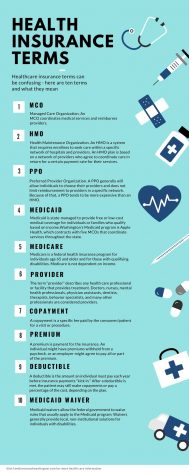Healthcare insurance includes words and abbreviations that can be confusing and hard to remember. This article describes a few key terms to demystify the health insurance world for Washington State families. Washington Healthplanfinder.org is a place to research insurance options statewide, with English and Spanish options.
Managed Care Organization (MCO)
A Managed Care Organization (MCO) is an agency that coordinates medical services and reimburses providers.
State medical insurance in Washington is called Apple Health. Apple Health pays a monthly premium to an MCO that an individual or family chooses to manage preventive, primary, specialty, and other health services. Apple Health also pays for some services directly, through Fee for Service (FFS).
The term “provider” describes any health care professional or facility that provides treatment. Doctors, nurses, mental health professionals, physician assistants, dentists, therapists, behavior specialists, and many other professionals are considered providers.
Clients enrolled in managed care must seek providers who are part of their plan’s network unless there is an emergency or prior authorization is arranged. Prior authorization means the insurance company agrees to pay for a service, treatment, prescription drug, medical equipment, or something else because it is determined to be medically necessary.
The Apple Health system includes five MCOs. Not all plans are available in all areas of Washington State.
- Amerigroup (AMG)
- Community Health Plan of Washington (CHPW)
- Coordinated Care of Washington (CCW)
- Molina Healthcare of Washington, Inc (MHW)
- United Healthcare Community Plan (UHC)
For complicated circumstances, an MCO may recommend a case manager be assigned to support an individual’s care. Families also have the option to request case management, especially if locating providers is difficult to meet unique or substantial needs.
Health Maintenance Organization (HMO)
A Health Maintenance Organization (HMO) is a type of MCO. An HMO is an independent system that requires enrollees to seek care within a specific network of hospitals and providers. An HMO plan is based on a network of providers who agree to coordinate care in return for a certain payment rate for their services.
Preferred Provider Organization (PPO)
A Preferred Provider Organization (PPO) is another type of MCO. A PPO generally will allow individuals to choose their providers and does not limit reimbursement to providers in a specific network. Because of that, a PPO tends to be more expensive than an HMO.
What is the difference between Medicaid and Medicare?
Medicaid is income dependent, and Medicare is not. Both provide government-funded healthcare.
Medicaid is state-managed to provide free or low-cost medical coverage for individuals or families who qualify based on income. Washington’s Medicaid program is Apple Health.
Medicare is a federal health insurance program for individuals age 65 and older and for those with qualifying disabilities. Medicare is not dependent on income.
Copayments, Premiums, and Deductibles
When healthcare is not free, the cost to the family adds up through the copayments, premiums, and deductibles. Here’s what that means:
- Copayment: a specific fee for a visit or procedure.
- Premium: payment for the insurance. An individual might have premiums withheld from a paycheck, or an employer might agree to pay all or part of the premium.
- Deductible: the amount of money an individual must pay each year before insurance payments “kick in.” After a deductible is met, the patient may still make copayments or pay a percentage of the cost, depending on the plan. Supplemental insurance through Medicare is sometimes an option to cover deductible expenses.
What is a Medicaid Waiver?
A Medicaid waiver allows the federal government to waive rules that usually apply to the Medicaid program. The intention is to reimburse for services that would not otherwise be covered by Medicaid. Waivers generally provide local, non-institutional solutions for individuals with disabilities. For example, in-home care paid for through a waiver might support someone to live in the community.
Medicaid.gov provides a Washington Waiver Fact Sheet that outlines waiver programs available in Washington State.

Download the illustration as a PDF – Health Illustrative

